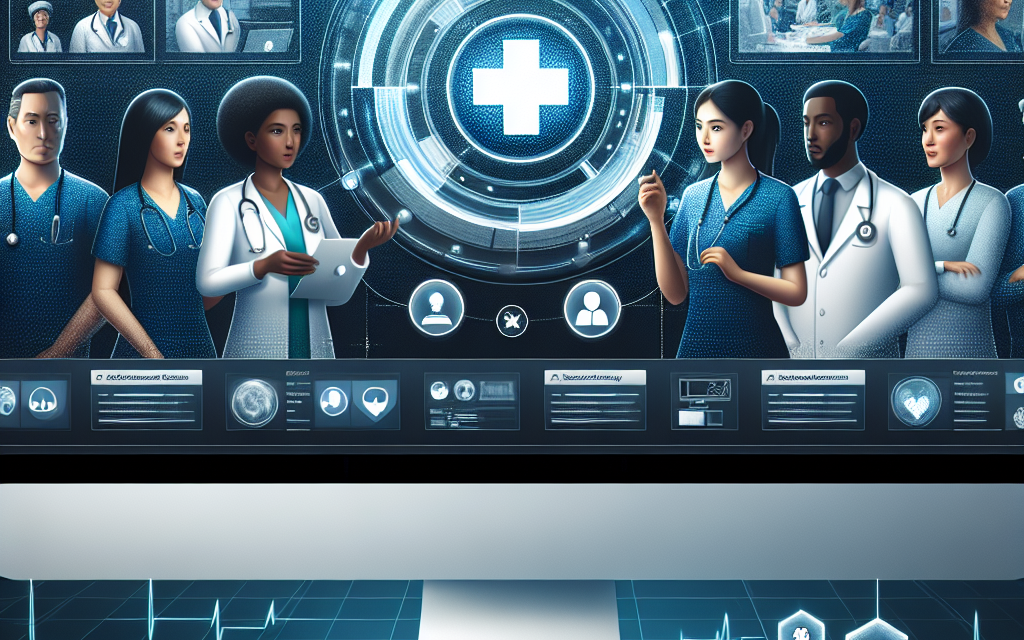Tailored EHR Solutions: Enhancing Healthcare Quality Through Specialist-Centric Approaches
In the rapidly evolving landscape of healthcare, the integration of technology has become paramount in improving patient outcomes and operational efficiency. One of the most significant advancements in this domain is the development of Electronic Health Records (EHR) systems. However, the effectiveness of EHRs can vary greatly depending on their design and implementation. Tailored EHR solutions, which focus on the specific needs of various medical specialties, are emerging as a powerful tool to enhance healthcare quality. This article delves into the importance of specialist-centric EHR approaches, exploring their benefits, challenges, and real-world applications.
Understanding Tailored EHR Solutions
Tailored EHR solutions are customized electronic health record systems designed to meet the unique requirements of specific medical specialties. Unlike generic EHR systems, which may offer a one-size-fits-all approach, tailored solutions take into account the distinct workflows, documentation needs, and regulatory requirements of different healthcare providers.
These specialized systems can significantly improve the quality of care by streamlining processes, enhancing data accuracy, and facilitating better communication among healthcare teams. The customization can range from specific templates for documentation to integrated decision support tools that align with the specialty’s best practices.
The Importance of Customization
Customization in EHR systems is crucial for several reasons:
- Workflow Optimization: Each medical specialty has its own workflow, which can be complex and nuanced. Tailored EHRs can streamline these workflows, reducing the time spent on administrative tasks and allowing healthcare providers to focus more on patient care.
- Improved Data Accuracy: Customized templates and fields ensure that the data collected is relevant and specific to the specialty, reducing the likelihood of errors and omissions.
- Enhanced User Experience: A user-friendly interface that aligns with the specific needs of a specialty can improve clinician satisfaction and reduce burnout.
- Better Patient Outcomes: By providing tools and resources that are directly applicable to their practice, tailored EHRs can lead to improved patient management and outcomes.
Benefits of Specialist-Centric EHR Approaches
The adoption of tailored EHR solutions offers numerous benefits that can significantly enhance the quality of healthcare delivery. Here are some of the key advantages:
1. Increased Efficiency and Productivity
One of the most immediate benefits of tailored EHR solutions is the increase in efficiency and productivity among healthcare providers. By customizing the EHR to fit the specific needs of a specialty, healthcare organizations can streamline processes and reduce the time spent on documentation and administrative tasks.
For example, a cardiology practice may require specific templates for echocardiograms and stress tests. A tailored EHR can provide these templates, allowing cardiologists to document findings quickly and accurately. This not only saves time but also ensures that critical information is captured consistently.
2. Enhanced Clinical Decision Support
Tailored EHR solutions can incorporate clinical decision support tools that are specific to a specialty. These tools can provide evidence-based guidelines, alerts for potential drug interactions, and reminders for preventive care measures.
For instance, an oncology EHR might include decision support for chemotherapy protocols, helping oncologists make informed decisions based on the latest research and treatment guidelines. This can lead to more effective treatment plans and improved patient outcomes.
3. Improved Patient Engagement
Specialist-centric EHRs can also enhance patient engagement by providing tools that facilitate communication between patients and providers. Features such as patient portals, secure messaging, and educational resources can empower patients to take an active role in their healthcare.
For example, a tailored EHR for a diabetes clinic might include educational materials on managing blood sugar levels, as well as tools for tracking glucose readings. This not only helps patients manage their condition more effectively but also fosters a collaborative relationship between patients and their healthcare providers.
4. Better Data Analytics and Reporting
Customized EHR solutions can provide enhanced data analytics capabilities, allowing healthcare organizations to track key performance indicators and outcomes specific to their specialty. This data can be invaluable for quality improvement initiatives and regulatory compliance.
For instance, a pediatric practice might use a tailored EHR to track vaccination rates and identify areas for improvement. By analyzing this data, the practice can implement targeted interventions to increase compliance and improve overall public health.
5. Streamlined Regulatory Compliance
Healthcare providers must navigate a complex landscape of regulations and reporting requirements. Tailored EHR solutions can help ensure compliance with specialty-specific regulations, such as those related to billing, coding, and quality reporting.
For example, a behavioral health EHR might include features that facilitate compliance with mental health parity laws and other regulations specific to mental health services. This can reduce the administrative burden on providers and help avoid costly penalties.
Challenges in Implementing Tailored EHR Solutions
While the benefits of tailored EHR solutions are significant, there are also challenges associated with their implementation. Understanding these challenges is crucial for healthcare organizations considering a transition to a specialist-centric EHR approach.
1. High Initial Costs
One of the primary challenges of implementing tailored EHR solutions is the high initial cost. Customization requires significant investment in software development, training, and ongoing support. For smaller practices, these costs can be prohibitive.
Healthcare organizations must carefully evaluate their budget and consider the long-term return on investment (ROI) associated with improved efficiency and patient outcomes. In some cases, financial assistance or grants may be available to help offset these costs.
2. Resistance to Change
Healthcare providers and staff may be resistant to adopting new technology, especially if they are accustomed to existing workflows. Change management is a critical component of successful EHR implementation.
To address this challenge, organizations should involve stakeholders in the decision-making process, provide comprehensive training, and communicate the benefits of the new system. Engaging staff early on can help alleviate concerns and foster a culture of innovation.
3. Integration with Existing Systems
Integrating tailored EHR solutions with existing systems can be complex and time-consuming. Many healthcare organizations use multiple software applications for different functions, and ensuring seamless interoperability is essential for maximizing the benefits of a tailored EHR.
Organizations should work closely with EHR vendors to develop integration strategies that facilitate data sharing and communication between systems. This may involve investing in middleware solutions or APIs to bridge gaps between different software applications.
4. Ongoing Maintenance and Support
Tailored EHR solutions require ongoing maintenance and support to ensure optimal performance. This includes regular updates, troubleshooting, and user support. Organizations must allocate resources for these activities to prevent system downtime and maintain user satisfaction.
Establishing a dedicated IT support team or partnering with an external vendor can help organizations manage these responsibilities effectively. Regular training sessions can also keep staff informed about new features and best practices.
5. Data Security and Privacy Concerns
As with any digital system, data security and privacy are paramount concerns when implementing tailored EHR solutions. Healthcare organizations must comply with regulations such as the Health Insurance Portability and Accountability Act (HIPAA) to protect patient information.
Organizations should prioritize security measures, including encryption, access controls, and regular security audits. Educating staff about data privacy best practices is also essential for minimizing the risk of breaches.
Case Studies: Successful Implementation of Tailored EHR Solutions
Real-world examples of successful tailored EHR implementations can provide valuable insights into best practices and potential outcomes. Here are a few notable case studies:
1. The Cardiology Clinic: Streamlining Patient Care
A cardiology clinic in California implemented a tailored EHR solution designed specifically for cardiovascular care. The system included specialized templates for echocardiograms, stress tests, and other cardiology-specific procedures.
As a result of the implementation, the clinic reported a 30% reduction in documentation time, allowing cardiologists to see more patients each day. Additionally, the integrated clinical decision support tools helped providers adhere to evidence-based guidelines, leading to improved patient outcomes.
2. Pediatric Practice: Enhancing Vaccination Rates
A pediatric practice in Texas adopted a tailored EHR solution that included features for tracking vaccination schedules and generating reminders for parents. The system also provided educational resources on vaccine safety and efficacy.
Within one year of implementation, the practice saw a 25% increase in vaccination rates among its patient population. The tailored EHR not only improved compliance but also fostered better communication between providers and families.
3. Behavioral Health Center: Improving Compliance and Care Coordination
A behavioral health center in New York implemented a specialized EHR designed for mental health services. The system included features for tracking treatment plans, medication management, and compliance with mental health parity laws.
Following the implementation, the center reported improved care coordination among providers, leading to better patient management and reduced hospital readmissions. The tailored EHR also facilitated compliance with regulatory requirements, minimizing the risk of penalties.
4. Oncology Practice: Enhancing Treatment Planning
An oncology practice in Florida adopted a tailored EHR solution that integrated clinical decision support tools for chemotherapy protocols. The system provided oncologists with access to the latest research and treatment guidelines.
As a result, the practice reported a 15% improvement in treatment adherence rates among patients. The tailored EHR not only enhanced clinical decision-making but also improved patient satisfaction by providing more personalized care.
5. Family Medicine Clinic: Streamlining Workflow
A family medicine clinic in Ohio implemented a tailored EHR solution that included customizable templates for various patient encounters. The system allowed providers to document visits more efficiently and access patient information quickly.
Within six months of implementation, the clinic reported a 20% increase in patient throughput, enabling providers to see more patients without compromising the quality of care. The tailored EHR also improved communication among staff, leading to a more cohesive team environment.
Future Trends in Tailored EHR Solutions
The landscape of healthcare technology is constantly evolving, and tailored EHR solutions are no exception. Several trends are emerging that are likely to shape the future of specialist-centric EHR approaches:
1. Increased Interoperability
As healthcare organizations continue to adopt tailored EHR solutions, the demand for interoperability will grow. Future EHR systems will need to seamlessly integrate with other healthcare technologies, such as telehealth platforms, wearable devices, and population health management tools.
This interoperability will enable healthcare providers to access comprehensive patient data, leading to more informed decision-making and improved care coordination.
2. Enhanced Data Analytics
The use of advanced data analytics will become increasingly important in tailored EHR solutions. Organizations will leverage data to identify trends, measure outcomes, and drive quality improvement initiatives.
Predictive analytics, in particular, will play a crucial role in identifying at-risk patients and implementing proactive interventions to improve health outcomes.
3. Focus on Patient-Centered Care
As the healthcare industry shifts towards a more patient-centered approach, tailored EHR solutions will need to prioritize patient engagement and empowerment. Features such as personalized health records, educational resources, and secure communication channels will become standard.
By fostering a collaborative relationship between patients and providers, tailored EHRs can enhance patient satisfaction and adherence to treatment plans.
4. Integration of Artificial Intelligence
The integration of artificial intelligence (AI) into tailored EHR solutions will revolutionize the way healthcare providers access and utilize patient data. AI can assist with clinical decision support, automate administrative tasks, and enhance predictive analytics capabilities.
For example, AI algorithms can analyze patient data to identify potential health risks and recommend personalized interventions, ultimately improving patient outcomes.
5. Emphasis on Data Security
As cyber threats continue to evolve, the importance of data security in tailored EHR solutions will only increase. Healthcare organizations will need to invest in robust security measures to protect patient information and comply with regulatory requirements.
Future EHR systems will likely incorporate advanced security features, such as biometric authentication and blockchain technology, to enhance data protection and ensure patient privacy.
Conclusion
Tailored EHR solutions represent a significant advancement in the quest to enhance healthcare quality through specialist-centric approaches. By customizing electronic health record systems to meet the unique needs of various medical specialties, healthcare organizations can improve efficiency, enhance clinical decision-making, and ultimately deliver better patient care.
While challenges such as high initial costs, resistance to change, and data security concerns exist, the benefits of tailored EHRs far outweigh these obstacles. Real-world case studies demonstrate the positive impact of specialized EHR solutions on patient outcomes and operational efficiency.
As the healthcare landscape continues to evolve, the future of tailored EHR solutions looks promising. With advancements in interoperability, data analytics, and artificial intelligence, these systems will play an increasingly vital role in shaping the future of healthcare delivery.
In summary, tailored EHR solutions are not just a technological innovation; they are a critical component of a patient-centered healthcare system that prioritizes quality, efficiency, and improved outcomes. By embracing these specialized approaches, healthcare organizations can position themselves for success in an ever-changing environment.





